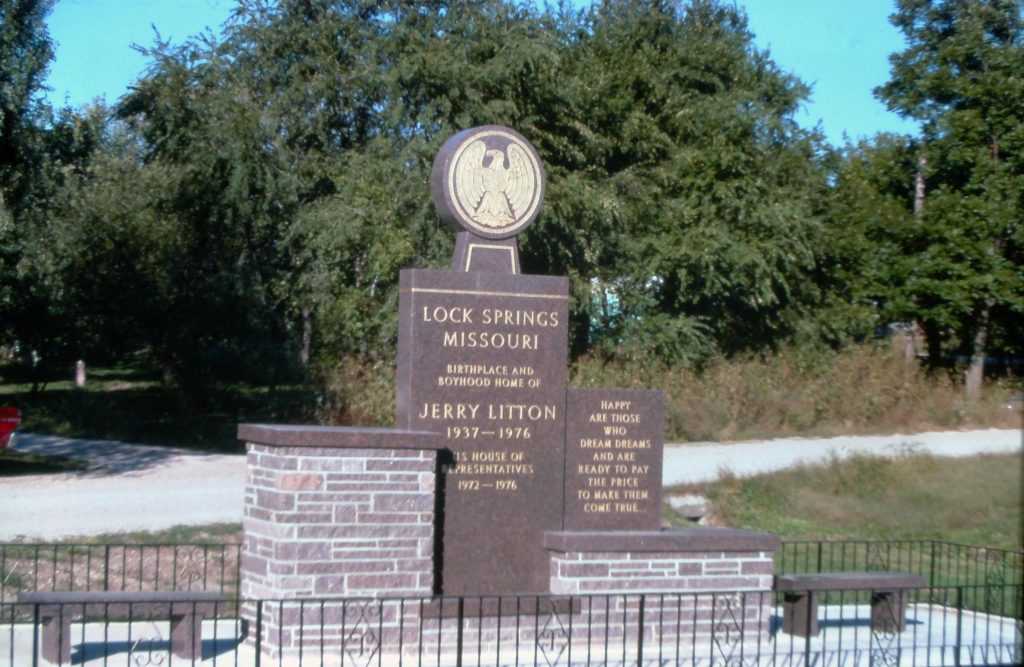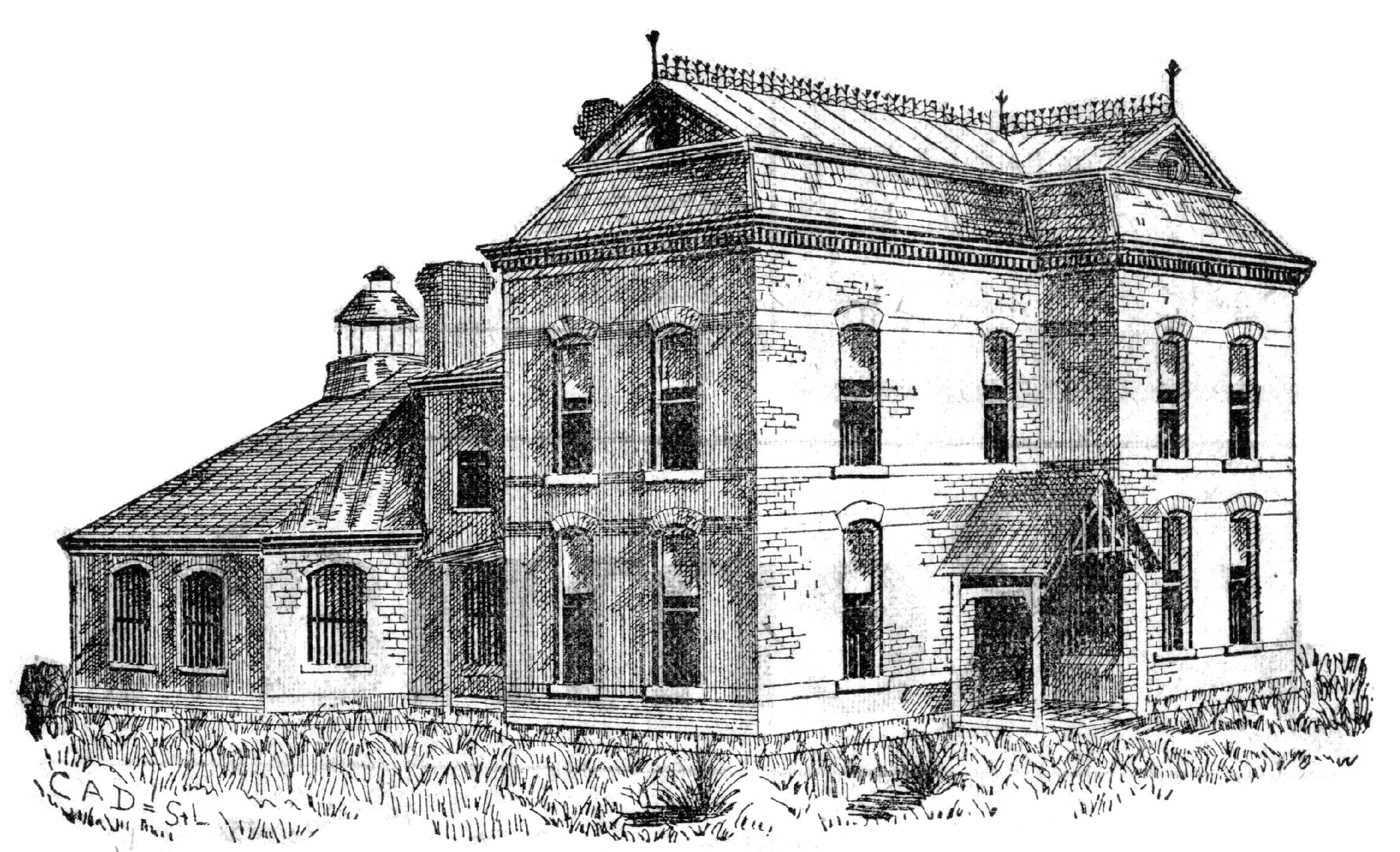Jerry Litton (1937-1976), along with his wife and two children, died in a plane crash on Primary Election night, Aug. 3, 1976, at Chillicothe Municipal Airport. Also killed in the crash were Paul Rupp, Jr., and his son, Paul Rupp III. The tragedy affected many people throughout Northwest Missouri, leaving an emptiness and void in the minds of those who believed in the vision Litton described for America’s future. The following tribute was written in the record of the board meeting of the Bank of Gallatin on Aug. 11, 1976, with copies delivered to Jerry’s parents, Charley and Mildred Litton, and other relatives and friends.
Jerry Litton, 39, was born at Lock Springs in Daviess County, MO, on May 12, 1937. He went to elementary school there and later graduated from the Chillicothe High School, where he was president of the National Honor Society.
Following graduation, Jerry became a newscaster at radio station KCHI in Chillicothe, after serving as president of the Missouri chapter of Future Farmers of America. Later he was elected national secretary of the FFA, and traveled to many states on speaking engagements before trade conventions, at business organizations and professional groups.
Jerry entered Missouri University at Columbia, where he was graduated in January, 1961, with a bachelor’s degree in agriculture journalism. He and Sharon Summerville of Chillicothe were married in 1959, while students at Columbia.
While at the university, Jerry worked as a newscaster at a Columbia radio station and as a newspaper reporter and farm editor. During his sophomore year he was elected vice-president of the student body; he was also named to the Mystical Seven for scholastic achievement and leadership; and he was Missouri chairman of students at MU for Kennedy and Johnson and national co-chairman of youth for Kennedy. Jerry was president of Young Democrats at MU, national chairman of “Youth for Symington” and served four years on the congressional campaign committee of Congressman W.R. Hull.
After graduation from the university, the Littons returned to Chillicothe where they were members of the Presbyterian Church and took up farming as a livelihood. Jerry joined his father, Charley Litton, in a farming partnership, and persuaded the members to invest in Charolais cattle, a new French breed. The partnership succeeded from the beginning, and prospered financially in a big way. The Littons sold Charolais cattle in many countries and soon earned a fine reputation, both national and international, as cattle breeders.
After Congressman Hull announced his retirement, Jerry became a candidate for Congress in 1972, in the 6th District of Missouri. He was tireless in his campaigning efforts. He had confidence and faith in an informed electorate. He made things happen according to plan. People voted for Jerry because of his intelligence, faith and emphasis on issues. He won confidence and support of many persons, both young and old, who soon became his devoted supporters, remaining loyal to him throughout all remaining political campaigns. He seemed destined to succeed and for leadership from the beginning. He was elected by a large majority of votes.
One remembers the refrain “Don’t let the stars get into your eyes,” but Jerry rejected it. He had stars in his eyes and dreams in his heart.
Following his election to Congress, the Litton ranch was sold and the assets placed in a blind trust. In his first term in Congress he quickly gained national attention as a progressive leader who could make things happen. He surrounded himself with young, capable and energetic people. He soon established a monthly television program called “Dialogue with Litton,” in an effort to bring government closer to the people. He invited many nationally known leaders to appear on this program.

Guests on “Dialogue with Litton” included Congresswoman Shirley Chisholm, Agriculture Secretary Earl Butz, former Vice President Hubert Humphrey, President Ford’s campaign manager Bo Callaway, FDR Jr., five democratic presidential candidates, Speaker of the House Carl Albert, and a host of other well known personalities.
Litton was re-elected to Congress in 1974 by taking 79% of the votes from his district. He had an abundance of energy, action and resolution at all times. He made dreams come true. Jerry was able to capture the heart, mind and loyalty of his friends and followers. His friends and supporters were devoted to him.

Jerry Lon Litton was an American politician from Missouri who served as a member of the United States House of Representatives representing Missouri’s 6th congressional district from 1973 until his death in 1976. A member of the Democratic Party, he ran for United States Senate in 1976. Litton won the Democratic primary, however he died in a plane crash while heading to his victory party.
Speculation arose almost as soon as he entered Congress of his becoming a U.S. Senator at an early date. Jerry dreamed of it, too. Jerry had a loyal and devoted following throughout the 6th District, consisting of 23 counties in Northwest Missouri, constituting about 20% of rural Missouri. This provided him a very strong base from which to campaign for the Senate.
After careful planning and at a meeting of a large number of persons at Columbia in early 1976, Jerry revealed a campaign plan that involved a careful and intense blend of television and radio advertising with a personal organization that would capture the state and Missourians for him by primary day. He relied heavily on the media of TV and radio, money, supporters, volunteers, workers and plane. He planned to spend more than a million dollars to achieve his goal. He announced his candidacy to the Senate at Columbia on Feb. 22, 1976.
Jerry had a personal political working organization in about 100 counties. He enlisted more than 2,000 volunteers for making telephone calls. He soon realized the importance of establishing his candidacy in the St. Louis area and also southeast Missouri. He set a goal of 20%, but actually received about 24% of the vote there. He carried 96 counties and was second in all other counties, except the county and city of St. Louis.
He served a blitz in St. Louis in April by TV and radio followed in late May with “Meet Me in St. Louis” of numerous volunteers and workers from all over the state coming to St. Louis to campaign for him there from door to door.
Let’s look at a day of Jerry’s campaigning. It is Monday, the last day before the primary election. He left his home about 9 a.m. and went to St. Louis; from there to Kansas City; from there to Joplin; from there to Springfield; from there to Cape Girardeau; from there to Columbia; and from there back to Kansas City to appear at Starlight Theatre to shake hands with the audience dispersing about 11 p.m. After more campaigning and business, he returned to his home about 3 a.m. primary election morning.

Democrats across the area were in support of Jerry Litton, including Nancy and Phil Tate of Gallatin, MO. Litton drew widespread notoriety using a popular, innovative television program called “Dialogue with Litton” that brought government to the people in a free, open-to-the-public town meeting atmosphere during the tumultuous times of the mid 1970s. Jerry Litton, the farm boy from Lock Springs, vaulted into national political prominence, some even predicting prominence as a future president. But tragedy occurred on Aug. 3, 1976, as Litton was flying back to Kansas City with his family to celebrate his primary election victory as the Democrat nominee for the U.S. Senate. The plane the Littons were in crashed during takeoff at the Chillicothe Municipal Airport, killing the entire family as well as Litton’s friend and pilot, Paul Ruff Jr.
How do you beat a campaigner like him? Who could beat Jerry Litton in a political contest? When I attempt to appraise the life of Jerry Litton, I think of the poet’s description of Mt. Fuji, when he says “The clouds themselves can hardly climb its height; the birds but skirt its side in soaring flight…”
After a busy primary election day with victory achieved, Jerry and his family, with the Rupps, entered the plane at Chillicothe about 8:30 p.m., heading for Kansas City, when the crash occurred.
Death came to him in the hour of his greatest triumph. He was destined for national and world leadership. Jerry Litton would have reached the Senate in the fifth year of his political life, but for fate. Like the ocean he is greater than all our descriptions of him. He reached above and beyond the timberline of the mountains. To such as he there is no successor.
Jerry knew that success in life consists in knowing how to change men’s minds. Jerry was not sectional, but cosmopolitan; he was neither north nor south, east nor west, but a typical Missourian of the great center state of Missouri.
How do you say farewell to a sleek, elegant and graceful ocean queen like the SS France that has carried a million passengers across the Atlantic and retires for no fault of her own, but by the high cost of fuel oil? (She too, is a casualty)
How do we say farewell to Jerry Litton? I quote the famous lines of Lawrence Binyon: “Jerry shall not grow old as we that are left grow old. Age shall not weary him nor the years condemn. At the going down of the sun and in the morning, we shall remember him.”
— reprinted from a pamphlet prepared for the Bank of Gallatin by Gallatin Publishing Company, written into the bank board’s minutes on Aug. 11, 1976

This memorial stands along Highway 190 in Lock Springs, MO, saluting favorite son Jerry Litton. The Congressman seemed destined for higher federal office when he and others were killed in an airplane accident at Chillicothe.

